Need personalized assistance? Your solution starts here!


Author Name - Education Vibes, May, 10 2023
1114
When you are reading this article, let’s assume you are from a medical background or you are an aspiring MBBS student. Hopping you may come across the term FMGE (Foreign Medical Graduate Examination) It is an examination for medical students who passed their MBBS/MD from foreign countries for candidates who chose MBBS abroad.
In a nutshell, FMGE (Foreign Medical Graduate Examination) allows medical graduates to start their medical career in India or any other country that conducts this examination. After passing this exam, students are awarded a license to practice in India or that particular country. If you still think you have very little info about this exam, you can browse our other blogs for know.
Coming to the main point recorded passing percentage of FMGE to date. The FMGE i.e. Foreign Medical Graduate Examination Dec 2022, which was conducted by the National Board of Examinations on the 12th of January 2023, announced the result on the 3rd of February 2023.
The passing percentage was 39.6%, which was truly an amazing thing that happened this year. It is no doubt outstanding results that rose high compared to the last few years. Unfortunately, the passing percentage of the FMGE (Foreign Medical Graduate Examination) has always been low, sometimes between 10 to 20%, which was not outstanding for sure. Furthermore, this year witnessed a maximum passing percentage and a large number of students qualified for the examination.
The high passing percentage has also been reasoned with the supposed uncertainty as well as fear of the NExT Exam i.e. National Exit Test which is scheduled to be introduced in the next academic year. Needless to say, the majority of students who sat for this exam know the FMGE pattern then NExT. They seem to have worked hard. Thus, we gave an outstanding result this time!
Let’s see the FMGE Session and Passing Percentage in detail.
|
FMGE SESSION |
PASSING PERCENTAGE |
|---|---|
|
2014 |
4.93% JUNE 20% DECEMBER |
|
2015 |
10.40% JUNE 12.2% DECEMBER |
|
2016 |
11.22% JUNE 8.08% DECEMBER |
|
2017 |
7.41% JUNE 13.89% DECEMBER |
|
2018 |
10.2% DECEMBER |
|
2019 |
20.7% JUNE |
|
2020 |
9.94% DECEMBER |
|
2021 |
23.91% DECEMBER |
|
2022 |
10.61% JUNE 39.6% DECEMBER |
A reputed daily stated with a general conversation of Union Health Ministry that this is an examination medical students have worked hard, therefore, the difficulty index might also have been slightly lower this DECEMBER 2022 exam.
FMGE (Foreign Medical Graduate Examination) is no doubt a tough exam in the country, and students show truly super results. In the end, it can be said, that it does not matter what the reason behind this excellent result in the passing percentage of the medical licensing exam in the country. It certainly seems promising, and at the same time assuring all Indian medical students who completed MBBS from foreign countries prepare their turn to excel in the FMGE (Foreign Medical Graduate Examination) or NExT (National Exit Test).
Also Read: FMGE Passing Percentage of Top Countries for MBBS

Author Name - Education Vibes, May, 17 2023
1147
Overseas graduates will be expected to pass the new National Exit Test (NExT) instead of the Foreign Medical Graduate Exam beginning at an undetermined date (FMGE). Applicants who want to practice in India must pass NExT within two years of finishing their medical education overseas.
The National Exit Test is now both the licentiate test and the national medical postgraduate exam that students/MBBS hopefuls must pass to receive a "Doctor" tag next to their name. The central government of India included the test in the National Medical Commission Bill 2019. The NEXT test will be established and rolled out in 2023 and will serve as a substitute for both the FMGE Exam and the NEET-PG Exam.
According to the presented by the National Medical Commission (NMC), all medical graduates who finished their MBBS abroad must also pass the National Exit Test within two years of their MBBS. This is because, as previously stated, it will replace the FMGE test, which was formerly the licentiate exam for practicing in India. Candidates must pass the NEXT test to be registered for medical practice in India. PG admission in Indian medical institutes will be solicited and determined based on the results of the Upcoming medical test. The NEET-PG exam, which is meant to assess the abilities and knowledge of final-year medical students, is also likely to be changed.
The new medical bill's goal is to provide a single-window exit test for final-year medical students. After the new legislation is in effect, there will only be one test for a final year degree, medical practice license, and medical PG admittance.
|
Full Name of Exam |
National Exit Test (NExT) |
|
Taking effect in |
2023 |
|
Conducting body |
National Board of Examination (Expected) |
|
Aim of exam |
|
|
Exam Mode |
Offline |
|
Question Type Exam paper |
|

Author Name - Education Vibes, May, 30 2023
603
If you pursue any of these careers in 2023, you will have the highest chance of being employed. As the world changes at a quick pace, introducing new possibilities and sectors, so are our employment alternatives. Students are no longer confined to conventional vocations like engineering and medicine, but may also study and pursue a wide variety of fascinating and inspirational careers.
The medical sector, notably MBBS, is expected to flourish in 2023. The MBBS degree is one of the most sought-after and recognized in the world of healthcare, and it is an excellent option for people who wish to make a difference in the lives of others.
MBBS graduates may look forward to a variety of fascinating job opportunities. They may pursue careers in medical research, education, public health, or even clinical practice. In each of these areas, MBBS professionals may have a significant influence and contribute to enhancing patients' quality of life.
MBBS professionals may pursue other fascinating and inspirational jobs, such as medical journalism, publishing medical publications, or working as medical consultants in the corporate sector, in addition to being highly sought-after in the medical area. These are all excellent possibilities for folks who wish to go out while still using their medical knowledge and expertise.
MBBS graduates may also look forward to a promising career in artificial intelligence (AI). Artificial intelligence (AI) is becoming an increasingly significant aspect of the medical industry, and MBBS professionals may use their knowledge and abilities to create and work on cutting-edge AI technology. This is a very intriguing area with the potential to change the way we practice medicine.
Nurse Practitioner is the second most common profession.
It's hardly surprising that this "hero career" has remained at the top for 2023. You may expect to earn about $111,680 per year and be recognized as someone who saves lives. Advanced practice registered nurses (APRNs) include Nurse Practitioners, Nurse Anesthetists, and Nurse-Midwives. They coordinate patient care and may offer general care as well as special treatment. Nurse Practitioners, Nurse Anesthetists, and Nurse-Midwives are all examples of advanced practice registered nurses, or APRNs. They may offer general and even specialty healthcare as well as coordinate patient care.
The third most popular profession is that of a Health Specialty Teacher.
If you love teaching adults, this might be a good profession for you. A postsecondary education and health specialties teacher's annual salary is $102,720. Colleges and universities employ the vast majority of health specialty instructors. Others, however, work in medical facilities, trade schools, or junior colleges. Further licensing and certifications may be necessary depending on the field in which you teach.
The fourth-highest-paying job is that of a Medical and Health Services Manager.
You might consider a career as a Medical and Health Services Manager if you enjoy the pay and security of medical professions but would prefer to sit at a desk in a setting with healthy people. At the desk, your daily tasks will be to organize, lead, and manage the business activities of healthcare providers.
You will be assisting medical professionals in managing the business part of their practice and keeping them organized if you do so. True, you'll be busy pushing paperwork and talking with physicians at the medical office, but not too busy to go to the bank and cash your huge wage check of about $100,980 every year!

Author Name - Education Vibes, Jun, 10 2023
602
United States: The United States Medical Licensing Examination, also known as the USMLE, is a three-part examination that evaluates a physician's capacity to apply knowledge, concepts, and principles, as well as to demonstrate fundamental patient-centered abilities that are necessary for providing safe and effective patient care. In order to become a licensed physician in the United States, one must first pass the USMLE.
The three steps of the USMLE are as follows:
USMLE Step 1: This is a computer-based exam that tests the candidate's understanding of basic medical sciences. The exam consists of 280 multiple-choice questions and is administered over a period of one day (eight hours).
USMLE Step 2: This is further divided into two parts - Clinical Knowledge (CK) and Clinical Skills (CS).
USMLE Step 2 CK: This is a computer-based exam that assesses the candidate's medical knowledge and clinical decision-making abilities. The test lasts for one day (nine hours) and consists of 318 questions with multiple-choice answers. The questions are spread out over the course of the day.
USMLE Step 2 CS: This is a clinical skills exam that evaluates the candidate's ability to gather information from patients, perform a physical examination, and communicate effectively with patients and colleagues. The exam is administered in person and consists of 12 standardized patient encounters.
USMLE Step 3: This test is administered on a computer and evaluates the candidate's capacity to apply medical knowledge as well as their comprehension of biological and clinical science, all of which are necessary for the practice of medicine without supervision. The exam consists of 233 multiple-choice questions and is administered over a period of two days (14 hours). Each step of the USMLE must be successfully completed in order to practice medicine in the United States. The National Board of Medical Examiners (NBME) and the Federation of State Medical Boards (FSMB) are responsible for administering the USMLE.
United Kingdom: The General Medical Council (GMC) is the regulatory body for doctors in the United Kingdom. Its primary role is to protect, promote, and maintain the health and safety of the public by ensuring that doctors meet the standards of practice and conduct required in the UK.
The GMC has several key functions, including:
Registration: The GMC maintains a register of all licensed doctors in the UK. In order to practice medicine in the UK, one must first become registered with the General Medical Council (GMC).
Education and Training: The GMC sets the standards for medical education and training in the UK. This includes the approval of medical schools and postgraduate training programs.
Professional Standards: The GMC sets the standards of practice and conduct required of doctors in the UK. This includes the investigation and adjudication of complaints against doctors.
Revalidation: The GMC requires all doctors to undergo revalidation every five years in order to maintain their license to practice medicine in the UK. This includes the completion of continuing professional development and the evaluation of the doctor's practice by their peers.
The GMC also oversees the Professional and Linguistic Assessments Board (PLAB), which is the licensing exam for doctors who have qualified overseas and wish to practice medicine in the UK. The PLAB consists of two parts: Part 1 is a written exam, and Part 2 is a practical exam that assesses the candidate's clinical skills and communication abilities.
These are just a few examples of the medical licensing exams required in different international countries. It's important to research the specific requirements of the country where you wish to practice medicine.
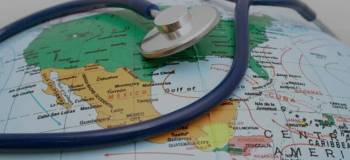
Author Name - Prashant Rana, Aug, 16 2023
626
Aware of unforeseen circumstances in the world, the National Health Commission has now allowed Foreign Medical Graduates (FMGs) who have not completed their internships due to “limited circumstances” such as: War and Covid-19 to register for internships in India if they are able to pass the Foreign Medical Graduate Examination (FMGE). The National Health Commission has also issued guidelines for the registration of foreign medical graduates. Aware of unforeseen circumstances in the world, the National Health Commission has now allowed Foreign Medical Graduates (FMGs) who have not completed their internships due to “limited circumstances” such as: War and Covid-19 to register for internships in India if they are able to pass the FMGE. The National Health Commission has also issued guidelines for the registration of foreign medical graduates.
Yes, of course, there are a lot of questions regarding the concerned decision of NMC. Well, let's dig up a bit, The National Health Commission (NMC) has relaxed the standards for one year, allowing foreign medical graduates who have passed a drug test to intern at non-teaching hospitals. Internships at 679 designated hospitals across the states will be allowed through May next year. The easing was announced as some students - especially those who completed training in China and Ukraine last year - had to complete a two-year internship to fill a gap in the process. The actual learning process has been hampered by pandemics and wars.
The National Health Commission made it clear on Wednesday that accredited non-university hospitals will be allowed to do internships for foreign medical graduates until May 2024.
This is going to be a reasonable step from the side of NMC, and this is a good approach towards helping the other students.
“This relaxation is granted only as one-time measure. The allotment of FMGs in these non-teaching hospitals shall also be done through concerned state medical councils,” said the circular.
“In addition to the above, it has also been observed that there are also foreign medical graduates who have not completed their internship due to a compelling situation beyond their control, such as the COVID-19 pandemic. -19 and war, and so on."
As per the official notification, "Given the pain and stress faced by these foreign medical graduates, their application to complete the remainder of their internship in India is considered an eligible:
“Accordingly, the state medical board can deal with the same issue provided that the applicant obtains an FMGE licence before applying to complete the internship in India,” the announcement added.
Considering all relevant NMC regulations and circumstances, the committee has issued a set of guidelines for FMG registration by the State Health Board, as noted.
A medical degree or GMF degree must be registered to practise medicine in the country where it is issued and must be equivalent to a licence to practise medicine issued to citizens of that country.
If completed at a foreign institution, documentary proof of successful completion of physical training or internship in the course of medical certification equivalent to MBBS.
A copy of passport with VISA details from immigration.
Candidates who wish to apply to India must pass the FMGE conducted by the National Examination Board (NBE).
The State Board of Health may enrol applicants who meet the above criteria for a 12-month period or a balanced period, if applicable.
Internships will be authorised at hospitals of the medical faculty or at hospitals affiliated with the medical faculty, as authorised by the committee.
The maximum quota for the distribution of internships to FMGs in the medical faculty should be capped at an additional 7.5% of the total authorised places.
State medical boards must obtain assurance from the medical faculty that the medical faculty will not charge FMGs any money/fees to allow them to practise.
GMF will receive a grant and other benefits equivalent to the training of Indian medical graduates in government medical colleges at the discretion of the relevant authorities applicable to institution/university or state.
FMGE: Number of hospitals offering internships
| Sl. No | State |
No. of Hospital |
| 1 | Andhra Pradesh | 30 |
| 2 | Andaman and Nicobar Island | 1 |
| 3 | Assam | 21 |
| 4 | Bihar | 29 |
| 5 | Delhi | 21 |
| 6 | Gujarat | 49 |
| 7 | Himachal Pradesh | 6 |
| 8 | Kerala | 20 |
| 9 | Madhya Pradesh | 45 |
| 10 | Maharashtra | 74 |
| 11 | Tamil Nadu | 40 |
| 12 | Karnataka | 62 |
| 13 | Odisha | 17 |
| 14 | Punjab & Haryana | 42 |
| 15 | Jammu & Kashmir | 2 |
| 16 | Nagaland | 1 |
| 17 | Rajasthan | 62 |
| 18 | Tripura | 1 |
| 19 | Uttar Pradesh | 72 |
| 20 | West Bengal | 33 |
| 21 | Daman & Diu | 1 |
| 22 | Dadra and Nagar Haveli | 1 |
| 23 | Manipur | 1 |
| 24 | Military Hospital | 15 |
| 25 | Railway Hospital | 27 |
| Total | 673 | |
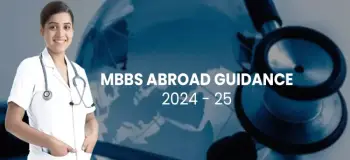
Author Name - Education Vibes, Jan, 30 2024
458
Studying MBBS abroad is a dream for many international students. You might be one of them with a long-cherished dream of becoming a doctor. A medical career is beyond doubt, a rewarding, exciting as well and challenging endeavor.
The demand for high-standard medical education and clinical training, cost of education, recognized degree, job prospects, and so forth are the concerns when you plan to study MBBS abroad.
It can be said without any shred of doubt that a large number of aspiring medical professionals explore opportunities beyond their home countries. Keeping in mind the fact we have prepared a guide for 2024-2025 to illuminate the way for those aspirants who like to study medicine abroad, say MBBS in Russia, Kazakhstan, Kyrgyzstan, Georgia, Nepal, Bangladesh, etc.
We are quite sure that this handy guide will give you valuable insight into the upcoming admission process and also help you find the best country to study MBBS.
Understanding the global landscape is one of the most important things when you plan to study MBBS abroad. This will help you study abroad in different ways.
Before diving into the specifics of medical admissions abroad for example many students want to study medicine abroad and choose MBBS in Kazakhstan, Georgia or Kyrgyzstan, therefore, it is important to know the global landscape of medical education.
Needless to say, MBBS in Georgia, Kazakhstan, Kyrgyzstan Russia, etc. have emerged as popular countries for international students seeking admission to medical programs because of affordable and high-quality medical education.
This is the reason you should research the medical curriculum, infrastructure, career opportunities, further education, scope to practise after completing MBBS, language of instruction, and cultural aspects of each country, say you are considering to study MBBS in Kyrgyzstan. It will not only help you make an informed decision, but also help you get the best medical school in that particular country.
Seeing approval and recognition is one of the foremost considerations when you choose a foreign medical school. Assuming you are from India and planning to study MBBS in Bangladesh then you need to see if the college you chose is approved and recognized by NMC and WHO or not.
Ensure that the medical college and the MBBS program you opt for are approved and recognized by international medical bodies such as the World Health Organization (WHO) and the Medical Council of your home country, as we said before if you are from Indian then the Medical Council of India, which is presently known as National Medical Commission. This not only ensures that your medical degree from MBBS abroad is globally accepted, but also facilitates smooth transitions during licensure and practice in your home country or anywhere in the world.
Each medical university in a foreign medical school, for example, MBBS in Russia or Kyrgyzstan may have distinct admission requirements. You should know the process for admission, duration, fees, and other important things before you move to that particular country.
The tenure of the program can also be different, for example, in Russia, the MBBS program is of 6 years, including 1 year of clinical internship. Whereas if you do MBBS in Kazakhstan; it is 5 years including 1 year of clinical internship.
It is, therefore, imperative to meticulously review and also understand these prerequisites, the process of admission along the duration of the program. You also need to understand the common criteria such as academic qualifications, and language proficiency, if required, though that is not required for studying MBBS in Georgia, Russia, Kazakhstan, Kyrgyzstan, Bangladesh, Nepal, Philippines, etc. You need to be well-prepared and plan accordingly to meet these requirements within the given time.
The entrance exam is mandatory one for many countries for MBBS admission, for example India, where NEET is a mandatory exam to study MBBS in Kyrgyzstan, Russia, Georgia, Kazakhstan, or Bangladesh. If you are coming from India and want to study MBBS in an NMC and WHO-approved medical school then having a valid NEET score is required.
On the other hand, in India, NEET is mandatory if you want to study MBBS in either a government medical school or a private medical school. Though private medical schools in India charge exorbitantly high tuition fees, which is why, a large number of candidates are moving to study MBBS in Bangladesh, Russia, Kazakhstan, Kyrgyzstan, and many other countries.
Now today, the NEET i.e. National Eligibility cum Entrance Test is a prerequisite for Indian students who are aspiring to pursue MBBS abroad. So, you should familiarise yourself with the particular exams required for your chosen destination, if any exam required, and invest time in comprehensive preparation.
Studying MBBS abroad involves financial planning. So, you should know first which medical school abroad is charging what medical fees exactly. You can compare the standard of education, recognition, exposure, etc. along with the feesf so that you can choose the best country to study MBBS.
In addition to that, you need to explore the opportunities for part-time work during your studies, if applicable or available to minimize the financial burdens. Therefore, understanding the cost of living, food and accommodation in the chosen country is crucial for effective budgeting for studying MBBS abroad.
Moving to a new country, like Russia, Georgia, Kazakhstan or Kyrgyzstan etc. entails cultural adaptation. Considering factors, such as lifestyle, climate, people, and societal norms are important when choosing a destination to study for MBBS. Therefore, familiarising yourself with the local food, people, culture and events not only eases the transition of your stay there but also enhances your overall experience as a student abroad.
A reliable and strong support system is important for international students studying MBBS abroad. Look for medical colleges that offer comprehensive student support services, including academic support, like counseling, language assistance, and accommodation, etc. When you can access these student support services, it can significantly contribute to your academic success and day-to-day well-being.
A VISA is one of the most crucial things that you need to understand first, and for that matter, an MBBS abroad Consultant can be a great help. You might not know which VISA and which VISA category is an application for studying abroad; they can help you with that. This will help your entire application process be smooth and hassle-free. They will also help you with the specific requirements during the application, documentation, and timelines associated with your visas.
Studying medicine in one of the top medical schools abroad is a life-changing decision that needs careful consideration, and we hope this handy guide will help as your study guide for medical science abroad, therefore, providing valuable insights into the 2024-25 MBBS admissions process.
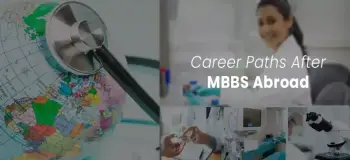
Author Name - Educationvibes, Feb, 03 2024
695
Studying MBBS Abroad is the most sought-after these days for several different reasons. Apart from high standard medical education, clinical training and international exposure, studying medicine Abroad holds more value when you compare it to doing the same studies in India or in your home country. A rough estimate will make you amazed as to why studying medicine Abroad is a greater choice than before. We are taking Russia as an example for studying MBBS.
You will also be amazed to know that more than 50k international students, from Asia, CIS countries, the Middle East and Africa study MBBS in Russia every year, and the number is growing by leaps and bounds.
Medical schools Abroad are all QS-ranked and offer high standard education at affordable costs and their standard of medical education is relatively higher when compared to India. Most countries invest a huge subsidy on their medical education for domestic and international students.
Finding your desired medical programs including MBBS at one of the top Universities Abroad, for example, Russia, Kazakhstan or Kyrgyzstan is easy. You just need to visit their website or get in touch with a trusted MBBS Abroad consultant who can help you choose the best medical school and country Abroad.
The career path after MBBS is diverse. You can work in various clinical settings, including hospitals, nursing homes, private clinics and even work as an independent medical practitioner. Let’s have a look at the diverse career paths after completing MBBS from one of the top medical schools in the world.
Medicine is a dynamic field. After completing MBBS Abroad, you can also pursue a PG in any specialisation of your choice and interest. There are huge research opportunities there after completing a PG in medicine. You will be able to work as an independent specialist doctor or can work as a specialist in a registered clinical setting. Working as an entrepreneur is also great. These days, many doctors are opening nursing homes or multi-speciality hospitals after completing their PG and gaining some experience.
There are many MBBS graduates from foreign countries from India working as civil servants for the state or federal government in various medical and administrative roles. So the choice is up to you, which one you choose or life as per your career objectives.
Studying MBBS Abroad is now super easy. You might be thinking that medical education Abroad is super expensive. Students suffer there. There might be no good job opportunities if you like to stay over there after completing MBBS, the visa process is so hectic, and they might be lost in loneliness. And, if you believe all these, you are missing out on some great things.
It's time to take you through the reality that can change. The reality is that you get exposure to varied cultures, expert guidance from universities, valuable career options, immense scholarship opportunities, and even the opportunity to learn new skills and languages every day.
Break free from all the assumptions and get to know the reality with Education Vibes, your trusted partner to Study MBBS Abroad.
If you are an MBBS aspirant and thinking about what to do next, then grab this valuable opportunity and experts from Education Vibes today! We will guide you towards greater achievements.
You will get one-to-one guidance throughout the entire process.

Author Name - Educationvibes, Feb, 21 2024
311
Medical education faces many challenges in keeping pace with the rapidly changing global healthcare needs. Traditional medical curricula, inadequate or lack of funding, weak quality assurance, and local accreditation practices contribute to the production of low-skilled physicians. This is happening all across the globe.
If we can’t properly merge healthcare with sustainable development, it wouldn’t be worthwhile for the common masses. To effectively address the healthcare issues of the 21st century, there is a crying need for new, effective, and efficient medical education, be it country-specific or MBBS Abroad. Here are some of the challenges faced that we need to modify.
In medical education, curriculum development is one of the most important things to have. For MBBS universities, the medical curriculum needs to be updated regularly, so that students can get up-to-date information on all medical domains. It plays a pivotal role in developing evidence-based curricula. The challenge is to incorporate new technologies, and facilities, like labs, libraries, dissection rooms, etc. are important. Universities must take a proactive role in bringing about the necessary changes in MBBS education.
Apart from evidence-based curricula, medical education should be recognised globally. The universities offering medical programs should be approved and accredited by international medical authorities and should updated regularly. Some renowned medical authorities, such as NMC, WHO, and FAIMER always provide updated information to make the medical curricula international standard.
The dependable healthcare system not only provides healthcare goods but also provides services to the population in different forms of healthcare products. A healthcare service or product might depend on its purposes. It targets various needs as considered to be preventive, treatable, diagnostic, and/or curative. Lack of resources can’t meet the demand of the masses; therefore, resource utilization is important.
Progress in various diagnostics or therapeutic applications and the use of modern technologies as well as tools combined help get longer life expectancy. To get these, one needs to have resources and their use. Many students who plan to study MBBS abroad for not get the proper facilities or resources that are needed in private medical schools in their home country.
The feminization of the medical profession is one of the most important things that can be considered a challenge in medical education. It is no doubt a worldwide phenomenon. Certified experienced women medical personnel not only play a key role in the whole spectrum of healthcare services but also share a large role in medical education. Therefore, it depends on a country’s average number of students participating in medical education. The ratio is increasing day by day for sure. This rising trend also challenges the system of healthcare organizations to play a core role. It offers various opportunities to adapt to the particular needs of female medical practitioners and to take advantage of their increasingly important role.
There is a huge shortage of qualified doctors the world over. This has been an international issue for years. This has met essential criteria for crisis all the time. A report has been published by WHO (World Health Organization) about the global shortage of almost 4.3 million doctors and nurses, as well as other healthcare professionals. This global issue not only generates a threat to the quality but also the sustainability of health education and systems worldwide. Foreign medical universities have taken an important role in this issue, where medical aspirants from all over the world are studying MBBS returning to their home country, and practicing over there.
A non-linear process sometimes refers to a threat as one that doesn’t progress or develop smoothly from one level to another in a logical way. Many believe a lot of students are moving to Study MBBS abroad, and this can be called a non-linear threat because brains are draining. The good thing is – when medical aspirants are not getting the opportunity to study medicine in their home country and when private medical schools in many countries charge exorbitantly high tuition fees, then studying medicine abroad can be a good choice. This way, a country can face the challenges towards sustainable development and minimize the shortage of doctors.
Due to inadequate administrative processes, many healthcare systems still need to meet the demands of the masses. This is especially true for a large country like India, China, or Russia. When the administration process increases properly the challenges can be overcome and ensure sustainable healthcare development. The process involves each level of management, combined with self-management decision-making. Both private and public hospitals need to increase the adequacy of their administration to smoothly function their healthcare system.
There are many challenges to sustainable healthcare in medical education. The healthcare sectors play an essential role in a country’s economy if it is an underdeveloped, developing, or developed country. The change in demographic patterns, inadequacy of resources, costs, feminization of medicine, a huge shortage of qualified physicians, good quality of medical training, research, and development, as well as affordable and satisfactory social well-being of personnel.
To manage all these things, these days, many medical aspirants are moving to Study MBBS abroad. They are looking for quality education where medical facilities and resources are there, cost is minimal, and a lot more. This helps not only, increase administrative processes, but also creates serious challenges that need to be addressed to provide a sustainable future of healthcare and medical education.
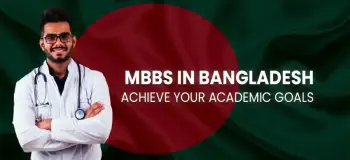
Author Name - Educationvibes, Feb, 28 2024
311
Our aspirations to get better lead us toward perfection though the journey of getting high-value outcomes out the life is never smooth. When it comes to the academic sphere we strive to get a quality education that is holistic and can nurture our bright future within. The 21st century is the era of innovation in science and medicine and demand of good doctors is growing rapidly. India has a great contribution to the medical field through a great number of Indian students seeking to study MBBS Abroad and they also seek the best destination to achieve their academic goals. MBBS in Bangladesh has come up recently as one of the most chosen destinations to study medicine.
Bangladesh once was a part of India thus it’s the weather, climate, food, language, culture, and society are most like India itself so, the chance of feeling alienated once you get admission to MBBS in Bangladesh is minimal. Bangladesh follows the international standards of medical education and the medical universities out there are accredited by WHO and NMC thus it makes it a credible nation to invest your money and time. Between 2015 and 2021, Indian students performed well in the FMGE after earning their MBBS in Bangladesh. The FMGE passing rate of Bangladesh was somewhat higher than that of the Philippines and considerably higher than that of China, Russia, Ukraine, Kyrgyzstan, Kazakhstan, and Belarus.
Bangladesh is home to good NMC-approved medical colleges and these medical institutions are known to provide a good quality of medical education. The five-year MBBS program in Bangladesh is followed by a year-long required rotational internship in a separate opt-in nation. The semester system is used for the course; a semester consists of six months. There are three phases to the MBBS course: pre-clinical, para-clinical, and clinical.
The study pattern for studying MBBS in Bangladesh is as follows.
For those who wish to Study MBBS Abroad, Bangladesh is undoubtedly one of the best destinations. It is not an uphill task to get MBBS admission in Bangladesh as the few simple steps are there and some specific eligibility criteria to fulfill. If you wish to study MBBS abroad then nothing can stop you as the line goes “ Where there is a will there is the way”
With this requirement, Indian students can study MBBS in Bangladesh and achieve the goals of their lives. The good medical universities welcome you to study there in a good and comfortable environment for perpetual growth towards perfection.
These are top government medical colleges in Bangladesh and these are dotted with many international students and a good number of Indian students are also studying there.
These are the top private medical colleges for studying MBBS in Bangladesh a plethora of students have studied there and now working as good doctors all over the world.
Bangladesh is not only a home of good medical colleges known for quality education but also the home of affordable medical colleges known for low MBBS abroad fees. This makes Bangladesh a more likable nation for medical education. MBBS Fees in Bangladesh are not as high as in India or other foreign destinations like the USA or the UK. The cost of an MBBS program in Bangladesh ranges from 24 to 35 lakh for the full five years. The MBBS BD program's popularity can be attributed to its identical curriculum, materials, syllabus, and study style to that of India. There are no additional costs; all payments are sent directly to the Bangladeshi medical college.
Bangladesh provides international students with excellent healthy surroundings in addition to reasonably priced medical education. In contrast to other nations, Bangladesh does not require pre-qualifying exams such as the TOEFL, IELTS, etc. for admission to MBBS programs. Admissions are determined by comparing the graduate courses' 12 class marks to the postgraduate courses' postgraduate course comparability between Indian and Bangladeshi degrees.
From good NMC-approved medical universities to affordable MBBS fees in Bangladesh or getting good opportunities to work after graduation or having fun while studying MBBS in Bangladesh. This is a nation with promises to help you achieve your academic goals with perfection. Get admission to a good medical university in Bangladesh and give your dream shape.
Trending Blogs

MBA in Finance in the USA: Fees, Top Colleges, Scholarships & Admission 2025
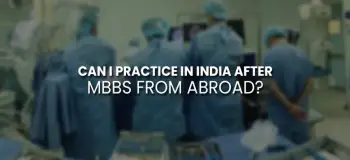
Can I practice in India after MBBS from Abroad?
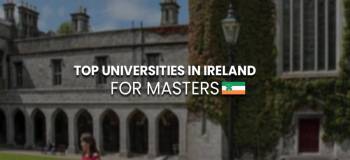
Top 10 Universities in Ireland for Masters: Courses, Cost, Scholarships & Admission 2025
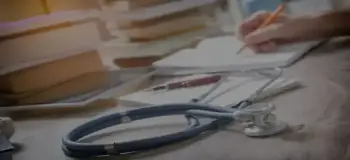
The Scope of Studying MBBS in Egypt for Indian Students
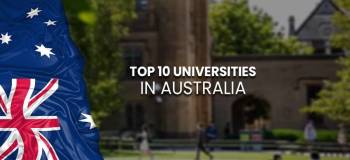
Top 10 Universities in Australia: Course Fees, Scholarships & Admissions- 2025
